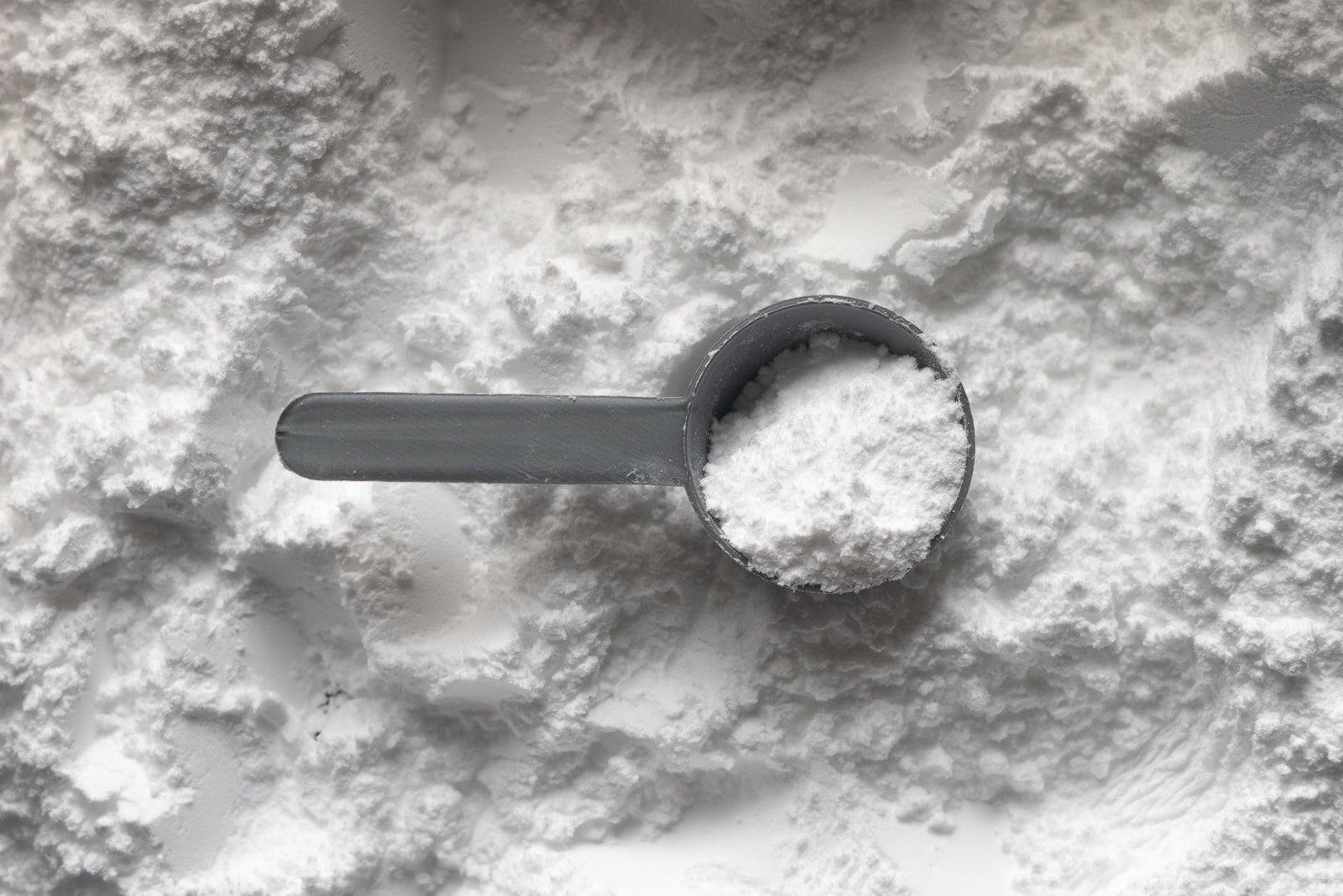As an athlete, you are always looking for ways to optimize your performance and training. And while nutrition and exercise are key factors in your success, certain supplements can help you train harder and maximize your results. HMB or hydroxymethylbutyrate is a natural metabolite of the essential branched chain amino acid L-leucine. Studies have shown that HMB may in fact increase muscle mass, strength, and possibly mitigate exercise-induced muscle damage post workout. But are HMB supplements proven effective to increase exercise performance? We’re going to discuss the research and find the facts about HMB supplements and if it can truly benefit your training outcomes. The answer may surprise you.
What Is Hydroxymethylbutyrate (HMB)
HMB is a natural metabolite of the essential branched chain amino acid L-leucine. Research has shown that leucine helps reduce exercise-induced muscle mass breakdown and increase muscle protein synthesis, otherwise known as the muscle building process.
How Does HMB Work
Approximately 5% of dietary leucine, which is derived from protein is oxidized into HMB. Luecine is first metabolized into a-ketoisocaproate (KIC). After leucine is metabolized to KIC, KIC is either metabolized into isovaleryl-CoA by the enzyme a-ketoacid dehydrogenase in the mitochondria, or into beta-hydroxy-beta-methylbutyrate (HMB) When compared to leucine, HMB appears to be more potent gram per gram at attenuating the rate of muscle protein breakdown, but less effective as leucine at inducing muscle protein synthesis. Due to this fact, HMB supplements are marketed as anti-catabolic agents, that reduce the rate of muscle protein breakdown rather than an anabolic agent, which increase the rate of protein synthesis. For reference, an individual would need to consume 60 g of leucine in order to obtain 3 g of HMB, which is the most frequently administered dosage for HMB in studies.
Benefits Of HMB
Several studies and meta-analyses have been conducted to investigate the potential ergogenic benefits of HMB, with specific emphasis on power output, muscle damage, body composition, and natural testosterone production.
HMB May Benefit Muscle Mass
Research has shown that supplementation with HMB combined with a resistance training program, may induce greater anabolic changes, than exercise alone. A review published in the journal Nutrients examined ten randomized controlled trials investigating the effects of HMB and physical function amongst 384 adults aged 50 years and older. Results showed that HMB supplementation in addition to physical exercise has no or fairly low impact in improving body composition, muscle strength, or physical performance in adults aged 50 to 80 years, compared to exercise alone [R].
A more recent review published in The American Journal of Clinical Nutrition investigated the efficacy of HMB on skeletal muscle mass and physical function in 15 randomized controlled trials, involving 2,137 participants. Although the effect size was small, HMB, and supplements containing HMB, increased muscle mass and strength. However, given the bias associated with many of the included studies, further high-quality studies are needed to determine and replicate ergogenic outcomes [R].
Therefore, the HMB benefits include elicit changes in muscle composition, attributed to a reduction on muscle mass breakdown, or proteolysis.
HMB May Reduce Muscle Breakdown
Evidence suggests that HMB may promote a reduction in muscle protein breakdown. In a study conducted at Iowa State University, 41 subjects were randomized into three different groups given a dose of 0, 1.5, or 3g of HMB per day, separated into two protein levels (normal, 117 g/day, or high, 175 g/day) with a training protocol of weight lifted for 1.5 hours, 3 days per week for three weeks. Results showed that supplementation with either 1.5-3g per day can partially mitigate or reduce muscle protein breakdown.
A second phase however was conducted to the study, with 28 additional participants. Participants were given 0 or 3g of HMB per day, with a lifting protocol of 2-3 hours per day, 6 days per week, for seven weeks. This phase concluded that fat free mass was greatly increased, in the HMB group as compared to the control.
Keep in mind that this is largely due to the fact, that training time increased from 1.5 – 3 hours per day, six days per week as compared to only three days in phase 1, with an additional 4 weeks of training. At an average of 100 calories burned per hour, this would result in 450 additional calories burned per week (150 kcal x 3) for four additional weeks, totaling 1800 calories.
A study conducted at Wayne State University in conjunction with Memphis University found no significant difference or positive effects of HMB supplementation compared with placebo on muscle catabolism, body composition, combined lifting volume, or repetitive sprint performance [R].
Does HMB Work
While numerous studies have shown a potential performance benefit and supported efficacy of HMB in exercise, a majority of research has shown inconclusive and mixed results. However, a position statement released from the International Society of Sports Nutrition, stated and concluded the following
- HMB can be used to enhance recovery by attenuating exercise induced skeletal muscle damage in trained and untrained populations.
- If consuming HMB, an athlete will benefit from consuming the supplement in close proximity to their workout.
- HMB appears to be most effective when consumed for 2 weeks prior to an exercise bout.
- Thirty-eight mg·kg·BM-1daily of HMB has been demonstrated to enhance skeletal muscle hypertrophy, strength, and power in untrained and trained populations when the appropriate exercise prescription is utilized.
- Currently, two forms of HMB have been used: Calcium HMB (HMB-Ca) and a free acid form of HMB (HMB-FA). HMB-FA may increase plasma absorption and retention of HMB to a greater extent than HMB-CA. However, research with HMB-FA is in its infancy, and there is not enough research to support whether one form is superior.
- HMB has been demonstrated to increase LBM and functionality in elderly, sedentary populations.
- HMB ingestion in conjunction with a structured exercise program may result in greater declines in fat mass (FM).
- HMB’s mechanisms of action include an inhibition and increase of proteolysis and protein synthesis, respectively.
- Chronic consumption of HMB is safe in both young and old populations.
HMB Supplements Commonly Asked Questions
Is HMB A Steroid?
HMB is not a steroid, it is a natural derivative of leucine, which is an essential branched chain amino acid, derived from dietary protein intake.
Does HMB Build Muscle?
Muscle mass can be built through two different mechanisms, reducing muscle protein breakdown, and increasing muscle protein synthesis. Studies suggest that HMB may in fact, reduce proteolysis or muscle catabolism increasing the net positive effects of protein synthesis. However, study results have been largely mixed, therefore, more evidence is needed to determine these results.
Is HMB Better Creatine?
Creatine has over 300 clinical studies which support ergogenic benefits of power, strength, and muscle performance. Although HMB has some evidence purporting it’s effects on muscle catabolism and increasing muscle mass, results are mixed, unlike creatine. Studies show that the combination of HMB and creatine monohydrate supplementation does not provide a greater ergogenic benefit compared to creatine monohydrate supplementation alone [R].
What Foods Have HMB?
Since HMB is a metabolite of leucine, it can be found in relatively small amounts, in lean proteins. HMB is also found in small quantities in foods such as grapefruit and alfalfa.
Should You Take HMB Every day?
Evidence suggests that HMB should be taken at least for two weeks, and one hour prior to training with a 3g dose to elicit the most favorable outcomes. It is important to supplement with HMB every day and consistently for proven performance outcomes.
Can I Take HMB and Creatine Together?
Yes, by taking creatine and HMB together, you technically should be able to take advantage of the efficacy of both supplements. That being said, studies suggest there is no additional benefit in taking HMB with creatine.
Which Is Better BCAA or HMB?
Although they both have leucine, they are independent of one another. BCAAS help reduce muscle mass breakdown and increase muscle protein synthesis. Both can be taken together to maximize muscle growth and prevent muscle breakdown.
HMB Supplements: Takeaway
It’s difficult to assess whether or not HMB can provide a substantial positive effect on performance, given the mixed and inconclusive body of evidence. The international society of sports nutrition, however, did take an official position, and concluded that HMB can in fact reduce muscle protein breakdown and induce muscle protein synthesis, proving its effectiveness as a potential ergogenic aid.
Ready to take your fitness to the next level with a proven sports supplement?
Swolverine's Kre-Alkalyn® is a patented pH correct form of creatine phosphate. With the addition of creatine phosphate (PCr) into the muscle cells, the body increases its immediate energy supply, by facilitating the production of ATP which increases power output and strength. High-intensity training programs require the body to go under strenuous aerobic and anaerobic conditions. By supplementing the body with creatine, you will induce a greater improvement in exercise endurance and athletic performance, resulting in improved times, more peak power, and stronger lifts.*
SWOLVERINE IS AN ENDURANCE ATHLETE AND ACTIVE LIFESTYLE BRAND. MADE FOR THE ELITE ATHLETE, AND THE STRONG-WILLED OUR PRODUCTS WERE DESIGNED TO FUEL YOUR ATHLETIC PERFORMANCE. WE PERFORM WHEN YOU PERFORM.
We believe that everyone can optimize not only their athletic performance but their human potential. The way we believe we can optimize performance is through transparency, clinically effective doses, and clinically proven ingredients with evidence-based outcomes. We provide the nutrients you need to power your active lifestyle.
References
Courel-Ibáñez, Javier et al. “Health Benefits of β-Hydroxy-β-Methylbutyrate (HMB) Supplementation in Addition to Physical Exercise in Older Adults: A Systematic Review with Meta-Analysis.” Nutrients vol. 11,9 2082. 3 Sep. 2019, doi:10.3390/nu11092082
Nissen S, Sharp R, Ray M, Rathmacher JA, Rice D, Fuller JC Jr, Connelly AS, Abumrad N. Effect of leucine metabolite beta-hydroxy-beta-methylbutyrate on muscle metabolism during resistance-exercise training. J Appl Physiol (1985). 1996 Nov;81(5):2095-104. doi: 10.1152/jappl.1996.81.5.2095. PMID: 8941534.
Danielle E Bear, Anne Langan, Eirini Dimidi, Liesl Wandrag, Stephen D R Harridge, Nicholas Hart, Bronwen Connolly, Kevin Whelan, β-Hydroxy-β-methylbutyrate and its impact on skeletal muscle mass and physical function in clinical practice: a systematic review and meta-analysis, The American Journal of Clinical Nutrition, Volume 109, Issue 4, April 2019, Pages 1119–1132, https://doi.org/10.1093/ajcn/nqy373
Mangine, G.T., VanDusseldorp, T.A., Hester, G.M. et al. The addition of β-Hydroxy β-Methylbutyrate (HMB) to creatine monohydrate supplementation does not improve anthropometric and performance maintenance across a collegiate rugby season. J Int Soc Sports Nutr 17, 28 (2020). https://doi.org/10.1186/s12970-020-00359-4
Find similar articles:
Supplements






